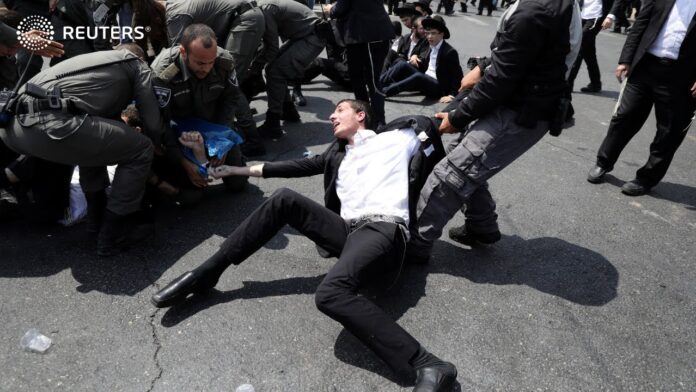Protests turn tumultuous as demonstrators clash with police amid a contentious court ruling
Jerusalem witnessed scenes of unrest and violence as ultra-Orthodox Jewish protesters clashed with law enforcement officers over a recent Israeli Supreme Court decision mandating military conscription for ultra-Orthodox men. The protests, which began peacefully, escalated into chaos as demonstrators expressed vehement opposition to the court’s ruling, which overturned decades of exemption from mandatory military service for the ultra-Orthodox community.
The focal point of the protests was Minister Yitzhak Goldknopf, the head of the United Torah Judaism party and Israel’s Housing Minister. As Goldknopf returned home, protesters targeted his car, hurling stones and setting fires that blocked major highways. Social media footage captured intense confrontations between protesters and police officers, with some demonstrators attempting to breach security cordons.
Israeli police responded with measures to disperse the crowd, using force to quell the violence. They arrested five individuals, two for assaulting officers and three for throwing objects during the clashes. Despite police efforts, tensions remained high throughout the day, reflecting deep-seated societal divisions over the role of religion and military service in Israel.
The Israeli Supreme Court’s ruling, issued just days before the protests erupted, declared that ultra-Orthodox men must now participate in the country’s mandatory conscription program. This decision also stipulates that government funding for religious schools (“yeshivas”) will cease unless their students comply with the draft requirement. Historically, ultra-Orthodox Jews have been exempt from military service, focusing instead on religious studies within their communities.
The clash in Jerusalem underscores broader debates about equality in civic duties and religious freedoms within Israeli society. Supporters of the court’s decision argue it promotes fairness and national unity by integrating all citizens into the defence forces. Conversely, opponents, primarily from ultra-Orthodox communities, view the ruling as an infringement on religious autonomy and a threat to their traditional way of life.
Minister Goldknopf, a prominent figure in the ultra-Orthodox community, symbolizes the leadership’s resistance to the court’s interference in religious affairs. His car being targeted by protesters highlights the personal and political stakes involved in this contentious issue. The protests reflect generational and ideological rifts within the ultra-Orthodox sector, where younger members increasingly question traditional exemptions and seek greater integration into broader Israeli society.
Analysis:
Political Perspective:
From a political standpoint, the clashes in Jerusalem underscore the complexities of governance in Israel, where religious considerations often intersect with state policies. The Israeli Supreme Court’s decision represents a landmark legal ruling aimed at fostering greater equality in national service obligations. Politically, it challenges the influence of religious parties like United Torah Judaism, which traditionally advocates for exemptions based on religious grounds. The government’s enforcement of the court’s ruling signals a commitment to uphold legal decisions despite opposition from religious factions, demonstrating the state’s authority over matters of national security and civic duty.
Social Perspective:
Socially, the protests reflect ongoing debates within Israeli society regarding the role of religion and its impact on public life. The ultra-Orthodox community’s resistance to military conscription highlights broader concerns about religious autonomy and integration. For decades, ultra-Orthodox Jews have maintained a distinct way of life centered around religious study, with military service exemptions serving as a cornerstone of their communal identity. The court’s decision challenges this status quo, prompting discussions about the balance between religious freedoms and national obligations. Social tensions are exacerbated by generational differences within the ultra-Orthodox community, where younger individuals increasingly support broader societal integration and participation in national institutions.
Economic Perspective:
Economically, the integration of ultra-Orthodox men into military service could have significant implications for workforce participation and economic productivity in Israel. Historically, the ultra-Orthodox community has had lower rates of workforce participation compared to other sectors of Israeli society, partly due to the focus on religious studies and exemptions from military service. The court’s decision to end blanket exemptions aims to promote greater economic equity by encouraging more ultra-Orthodox men to enter the workforce after completing military service. However, implementation challenges may arise, including the need for vocational training and educational reform to facilitate successful integration into the labour market. Economic considerations thus intersect with social and political dynamics, shaping the ongoing discourse on national service obligations and religious freedoms.
Racial Perspective:
From a racial perspective, the protests highlight divisions within Israeli society along religious and cultural lines rather than racial ones. The ultra-Orthodox community, while distinct in its religious practices and social norms, is ethnically and racially diverse within the broader Israeli Jewish population. The tensions and debates surrounding military conscription primarily revolve around religious identity and communal rights rather than racial discrimination. However, discussions about equality and integration encompass broader societal challenges related to diversity and inclusion, emphasizing the multifaceted nature of Israeli identity and citizenship.
Gender Perspective:
Gender dynamics play a crucial role in the context of military conscription in Israel, where both men and women are subject to mandatory service. The court’s ruling specifically targets ultra-Orthodox men, highlighting gender disparities within religious communities regarding military obligations. Historically, ultra-Orthodox women have not been subject to conscription, focusing instead on family and religious roles within their communities. The debate over military service exemptions intersects with broader discussions about gender equality and societal roles, raising questions about the balance between individual freedoms, communal rights, and national responsibilities.
